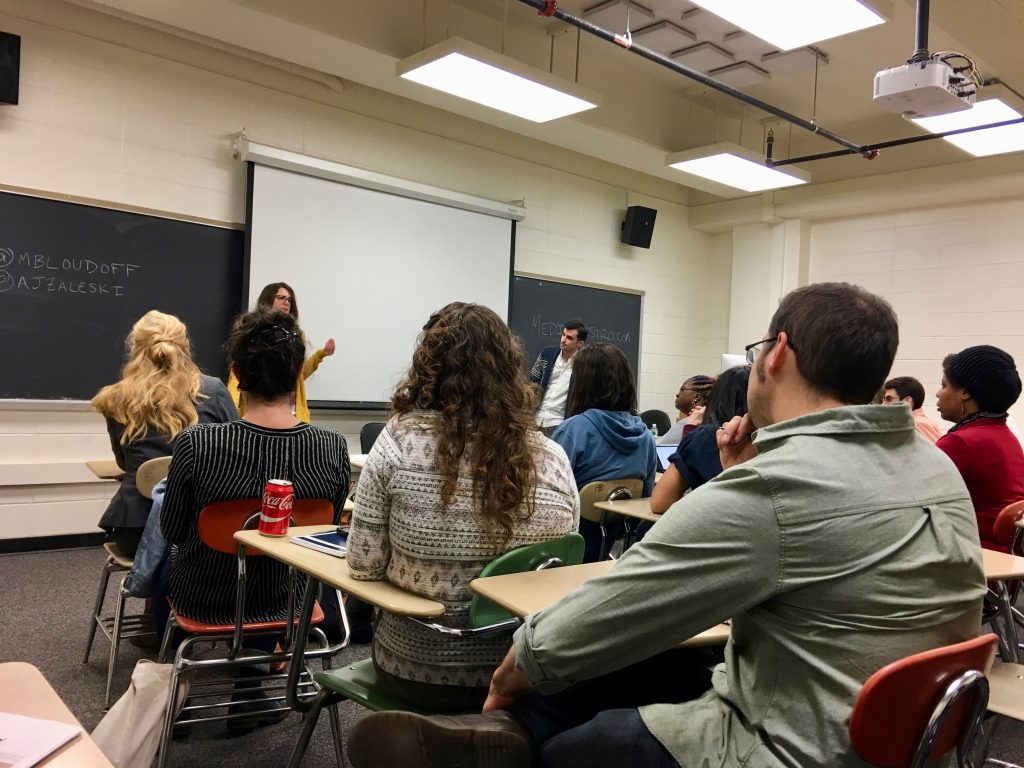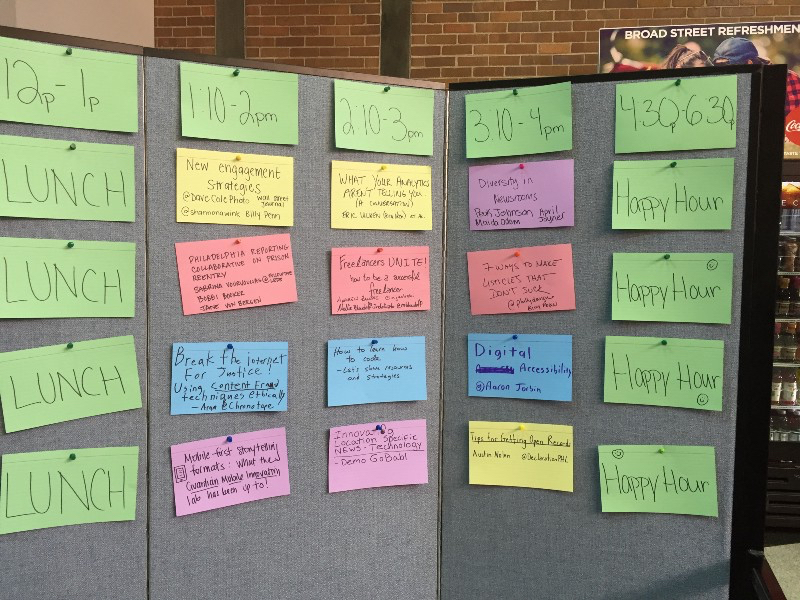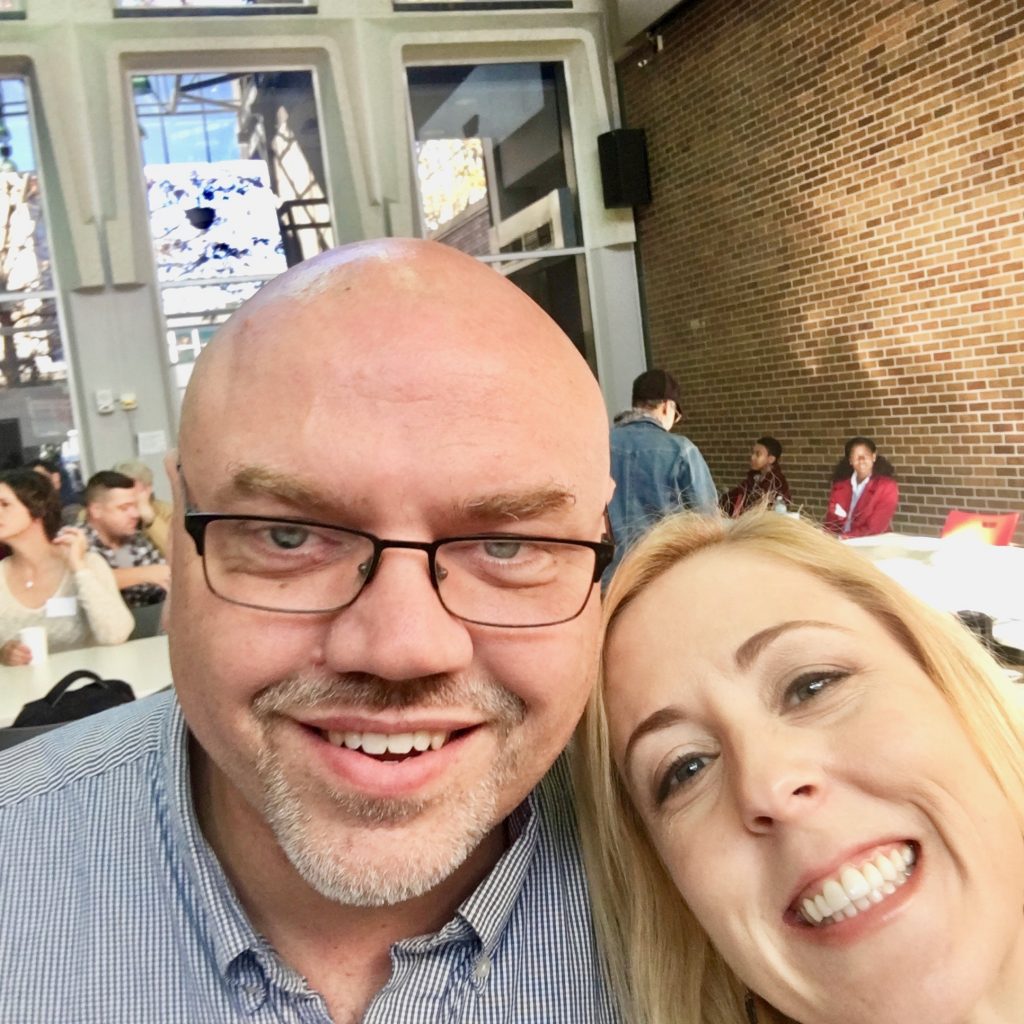________________________________
Lesson One from BCNI16: I really should take notes at these things.
Back in the day, I’d incessantly click-clickety-click on my laptop, playing along with the recognizable soundtrack of the New Journalrusalem. At some point in the last eight years, I lost focus. Or, if one is generous, I concentrated on “just listening and absorbing” the lessons at BCNI sessions (“listening and absorbing” being the Newer Journalrusalem song-and-dance).
Next year I’m going back to notes. I may even bring an analog pen and paper notebook. (I KNOW! Crazy.) I want to write these reviews well and the fact is, I need to be reminded of all that I listened to and absorbed. A lot of knowledge is dropped at BCNI, and I’m only human. Basic info like the titles of the sessions I attended would be handy right about now. Unconferences don’t do helpful things like post the session titles online for post-erity (see what I did there). Searching through the hashtag, I came up with some photos of the board to remind me.
In the morning, I attended “Sponsored Content Isn’t Evil” given by Brian James Kirk and Michelle Freeman. Then I wandered a bit for the next session and ended up in Michael Gold and Daniel Victor’s “Objectivity in Journalism” session, which was standing room only (this is the session in which I corrected a speaker’s use of “girl” to refer to a grown woman in the room #notsad #willdoitagain).
In the afternoon, I attended Aram Zucker-Scharff’s session “Break the Internet for Justice! Using Content Fraud Techniques Ethically.” After that I went to Mollie Bloudoff-Indelicato and Andrew Zaleski’s session “Freelancers Unite! How to Be a Successful Freelancer.” My final class was “7 Ways to Make Listicles that Don’t Suck” bravely given by Danya Henninger (why “bravely”? I’ll get to that in a minute [and yes, I know I placed the ? outside of the “”. Grammar evolves]).
Lesson 2 from BCNI16: I really should’ve taken notes. No, really.
Although my work and dream (aka a published sci-fi novel) schedule wouldn’t allow writing up details of each session, if I had taken notes I could at least share key points. For now my crappy memory will have to do. Here are some noteworthy thoughts from or generated by each session:
Sponsored Content Isn’t Evil
We’ve moved on from promotional articles to event sponsorship and patron-artist relationships. This means one doesn’t write a glowing promo ad/article for Comcast, say. It means building a method through which Comcast can fund journalistic work. Sometimes this is underwriting of coverage of a certain subject (hopefully not in conflict with the outlet’s integrity and not related to Comcast’s image). Other times this is paying for lunch at events organized by the outlet. Said outlet may have a readership Comcast wants to meet in person, so sponsoring such an event gives Comcast access to that readership and gives the outlet some funding (above and beyond event costs). It’s no secret Technical.ly is sailing along on event sponsorship. Take a second, though, and absorb that: A news outlet is an event company, essentially leveraging its readership in order to provide those readers with quality news coverage. Innovative. And it MAY JUST WORK (see Technical.ly’s expansion rate into other cities).
This made me think of my hyperlocal blog and whether or not I want to adopt one or more of the ideas that came from this session. I’m still thinking about it. Leveraging one’s audience means one must 100% commit to providing that audience with consistently high-quality journalism. Seeing that I don’t have media insurance (will get to that in a minute, too), I’m not quite sure I can ask the local government the tough questions. I’m not even committed to posting on a regular schedule, let alone dog the corruption cats in this town. Still, the session gave me some insights into the reader-producer relationship nowadays. We readers have always been leveraged. Being approached at an event by Comcast because they are interested in me as a customer or as a potential employee is not a bad feeling. Facebook’s creepy geo-tracking is a bad feeling. This is actually OK, if not (dare I say) cool.
Objectivity in Journalism
I arrived too late to this session to sum it up well. One thing I do have to say, though: Seriously? Seriously. Why are we still talking about this? Sociology, Anthropology and Psychology (and maybe even Physics) have statistically and categorically answered this question: The concept of objectivity as we’ve all known it does not exist. Why do journalists struggle so dearly and consistently with this concept? Thankfully Mr. Gold and Mr. Victor were on board with the truth, which is: humans aren’t gods; we cannot erase our biases.
Here’s my question: Can we move onto different theories on how best to deal with our biases? The social sciences could use some input on that, as they aren’t “applied” practices, as it were. Gold and Victor, I think, were trying to move the crowd in that basic direction, but, as always, there were a few holdouts. This is an education problem. J-school has some serious issues it needs to address.
Break the Internet for Justice! Using Content Fraud Techniques Ethically
Aram’s session, frankly, made my head spin. The easiest part for me to understand was how bots build fake accounts (to seem like real humans) and direct actual humans to sites that scrape other site’s content. A light bulb went off for me at this point, because for the last several months I’ve had what Aram described as “typically young, female, sexy” Twitter profiles follow me en masse. These profiles usually have no bio or URL and are simple aggregates of click bait. Here’s one I got today. I give it an A for effort, though, because this is the first of such accounts I’ve seen with a bio. See the tweets? Just links to arccasa.com. No real human interaction.
Aram let us know that the bots follow real people on Twitter to lure them into following back, therefore lending legitimacy to the account. The fake account needs to appear to be real to get past other anti-spam bots on various sites. Simply following a real account, like mine, helps to gain that legitimacy. So I’ve begun blocking any and all accounts I find suspicious. I’m sorry if you are a real person and I’ve blocked you. You are a victim in spam war and content fraud. Contact me and I’ll fix it.
Content fraud and ad arbitrage are above my head, and I don’t feel confident enough to teach it to you at this juncture. But Aram gets it, and you should ask him. I do love the concept he put forth: use their weapons against them. When I have an explainer, I will share it. Aram’s a smart guy and a friend I’ve made purely through loving each and every word he’s had to say at all of the previous BCNIs (Got a book rec from him this time at the Happy Hour, too: Jennifer Government. Reading it now).
Knowing who to block on Twitter is a major piece of info I got out of this session for now, though, and that’s worth TONS.
Freelancers Unite! How to Be a Successful Freelancer
More true, real, applied, actionable, valuable, priceless information came out of this session. I’m new to journalism, coming from IT and academic research. I don’t know the everyday ins and outs of the practice. One of the reasons I haven’t fully committed to my hyperlocal blog is because I have no insurance against getting sued. Perhaps young j-school grads aren’t aware of the workings of our civil justice system, but like the ancient Greeks we are a quite litigious society. Free speech isn’t free and one practicing it needs indemnity. I’ve been asking (the wrong people, obviously) for months about this. The answer came in this session. We were talking about contracts. Major news orgs have indemnity clauses in freelancer contracts that usually try to clear the organization of any liability if said org gets sued (which happens a lot). Presenters MBI and AJZ advised the freelancers that any clause so stating can be and should be removed from any freelancer’s contract. The organization is absolutely on the hook for what they publish; they’re just trying to get one over on the little guy. Don’t fall for it.
So: media insurance. Apparently there is some writers guild option? I didn’t get that far in the session. I’ll keep researching. Any clues, please let me know.
Other awesomeness from this session are some networking opportunities that have yet to come to full fruition for me but I’m hoping they do. That’s actionable, measurable stuff right there, folks. BCNI gets better each year for concrete information and advice, not just for beginners but for middle news managers and up.
7 Ways to Make Listicles that Don’t Suck
Danya Henniger’s session as well as Brian James Kirk’s Sponsored Content Isn’t Evil session were presented honestly and bravely at BCNI this year by these two old school journalists, and it warmed my heart. Listicles and sponsored content are, by anyone’s standards, social media topics. These topics were shunned if not outright despised by the traditional journos in previous years of BCNI. It was awesome to see the concepts accepted as realities in this year’s New Journalrusalem.
(BTW: Are you wondering why I’m cheekily referring to the 1980s movie Working Girl and its Carly Simon theme song in this article? I’m “making a funny” as the kids say, but only partly. Working Girl [don’t get me started about the “Girl”] is about a bootstrapping Wall Street wannabe’s gritty methods in breaking down the old guard’s doors. You may think I’m referring to myself in the world of [tech/science] journalism here. Perhaps. If you’ve got some guts, though, think a bit more about the state of the 4th Estate and its practitioners. Go ahead. Let that river run. Be brave like Danya and Brian. I troll you all with love.)
As for Listicles, here are some of Danya’s points:
- Don’t worry about rounding off. “6” is as good if not better than the standard “10” or “50.” Have a little journalistic integrity and include what belongs on the list and nothing else. If the number comes out to be 13, run with it.
- It’s OK to NOT include the expected entries on a list. There was some discussion in the room, though, about whether or not to address their exclusion. What came out of that chat, as far as I can tell: You can certainly write a headline like “9 Best Cheesesteak Places That Aren’t Tony Luke’s” to make it clear you don’t want to hear from the Tony Luke diehards. But it’s also OK to simply skip the typical expected stuff and not mention it. it’s up to you. Know the latter option may generate more comment hell. You’ve been warned.
- Listicles aren’t evil, either, and their popularity helps pay the bills. Danya, who now works for Billy Penn but used to work for King of Listicles, Zagat, writes them with integrity and purpose. Lists are how we absorb info now and they are absolutely a method of honest reporting. Here are the top 2 things you need to do about it:
- Get over it
- Get onboard
Lesson 3 from BCNI16: Happy Hour is another place to take notes
HAPPY HOUR
Happy Hour was fun and as always a great way to meet new people. I met two young Philly Biz journalists whom I won’t out here but I really enjoyed talking to them. Also saw some journos I haven’t talked to since the Pen and Pencil meetup after ONA14 (the 2014 Online News Association Conference which I attended thanks to a CPIJ and Knight Foundation Fellowship). They took my advice back then and disregarded the top-desk’s search for “Cinderella coders” for their newsrooms. (Code or Journal. There is no try. If you code, demand much, much more pay.) We chatted about Mr. (head of Temple’s J Dept) Boardman’s oped on the Pen and Pencil’s Off the Record meetups. Perhaps the journo community was abuzz about it, but I had to bring it up to hear any opinions on the subject. (Chris Wink had a FB discussion about it I found quite informative.)
Many familiar faces were in attendance but I missed chances to say hello. Part of the reason for this is I’ve instituted a “no schmoozing” rule this year. As a naturally (and this is an understatement) gregarious person, I fear I can be somewhat of a pest. To mitigate this, I’m resisting approaching others at events. My theory is that if they want to say hello, they will do so. Sure, they may simply be distracted or busy, but that is also a reason why I shouldn’t bother them, right? I’m sorry if you were one of the “them” this year. I wasn’t ignoring you; I was letting you be. 🙂 Do me a favor and say hi next year. Hopefully I’ll be sitting with my best BCNI friend Heather Chin who couldn’t come this year because she was journaling things in her hometown of NYC.
Other sources on BCNI16:







Comments on this entry are closed.